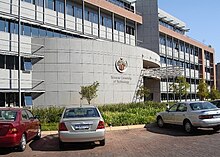Tshwane University of Technology
 | |
| Motto | We empower people Ons bemagtig mense |
|---|---|
| Type | Public university of technology |
| Established | 1 January 2004 (Formed as a result of a merger of three established institutions) |
| Chancellor | Gwendoline Malegwale Ramokgopa |
| Vice-Chancellor | Lourens van Staden |
Academic staff | approx. 855 |
Administrative staff | 2,700 |
| Students | approx. 100,000 |
| Location | , 25°43′56″S 28°09′43″E / 25.7322075°S 28.161871700000006°E |
| Campus | six campuses, mostly urban |
| Colours | Blue Red Gold |
| Nickname | TUT |
| Affiliations | HESA[1] NADEOSA[2] |
| Website | www.tut.ac.za |
Tshwane University of Technology (TUT; Afrikaans: Tshwane-Universiteit vir Tegnologie) is a higher education institution in South Africa that came into being through a merger of three technikons — Technikon Northern Gauteng, Technikon North-West and Technikon Pretoria.
As the number of students registering annually grows rapidly, records show that Tshwane University of Technology caters for approximately 90,000 students and it has become the largest residential higher education institution in South Africa.[citation needed]
Campuses[]


The university occupies eight campuses: Pretoria, Soshanguve, Ga-Rankuwa, Witbank (eMalahleni), Mbombela (Nelspruit) and Polokwane. Two faculties, namely the Faculties of Science and The Arts, have dedicated campuses in the Pretoria city centre.[3]
Student enrollment[]
There were 88,078 students enrolled for the year 2012 at the Tshwane University of Technology. It was estimated, for the year 2014, that the number of first year student applications the university received were around 80,000. Tshwane University of Technology predominantly provides vocational qualifications in the form of three-year diplomas. Articulation options exist in the form of advanced diplomas, postgraduate and masters and doctoral degrees. These qualifications are offered through the following faculties:
- Faculty of Arts and Design
- Faculty of Science
- Faculty of Engineering and the Built Environment
- Faculty of Information and Communication Technology (ICT)
- Faculty of Humanities
- Faculty of Economics and Finance
- Faculty of Management Sciences (including Business School)
Ranking[]
In 2010 Webometrics ranked the university the 15th best in South Africa and 5662th in the world.[4] In 2018, the university ranked 9th best university in South Africa
The United Nations Educational, Scientific and Cultural Organisation (UNESCO) ranks the university's Department of Journalism as one of twelve Potential Centres of Excellence in Journalism Training in Africa.[5][6]
See also[]
- List of universities in South Africa
- List of post secondary institutions in South Africa
References[]
- ^ "Higher Education South Africa". www.usaf.ac.za. HESA. Archived from the original on 2009-08-04. Retrieved 9 July 2021.
- ^ "National Association of Distance Education Organizations of SA". www.nadeosa.org.za. Retrieved 9 July 2021.
- ^ http://www.sarua.org/?q=uni_Tshwane%20University%20of%20Technology Tshwane University of Technology Retrieved 31 December 2011
- ^ "Top Africa". Ranking Web of World Universities. Archived from the original on 4 October 2009. Retrieved 26 February 2010.
- ^ http://www.tut.ac.za/Students/facultiesdepartments/humanities/departments/Documents/Prospectus%20Journalism%20-%202010.pdf
- ^ http://unesdoc.unesco.org/images/0015/001514/151496e.pdf
External links[]
- Tshwane University of Technology
- About Tshwane University of Technology, TUT
- About Tshwane University of Technology - Section Staff members
Coordinates: 25°43′56″S 28°09′42″E / 25.73222°S 28.16167°E
- Tshwane University of Technology
- Public universities in South Africa
- Technical universities and colleges
- Universities in Gauteng
- Universities in North West (South African province)
- Universities in Limpopo
- Universities in Mpumalanga
- Schools in Pretoria
- Educational institutions established in 2004
- 2004 establishments in South Africa
- Science and technology in South Africa
- South Africa university stubs
